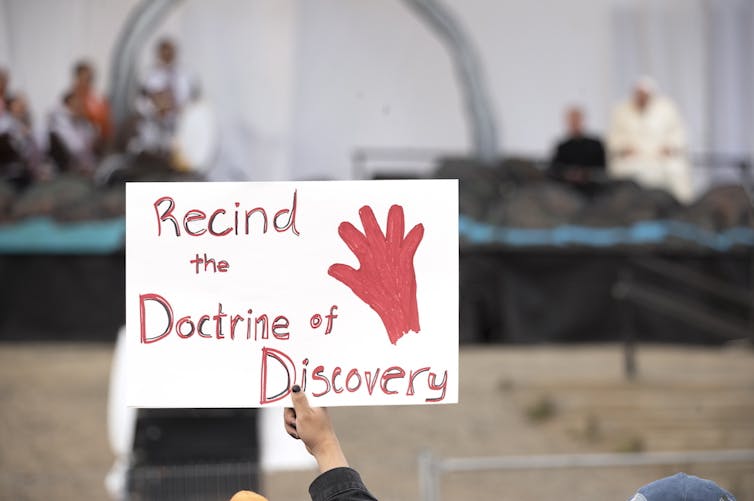Last week, the Vatican finally distanced itself from the Doctrine of Discovery — a hundreds of years old decree that justified land theft and enslavement of people who were not Christian.
In this episode of Don’t Call Me Resilient, political and Indigenous studies scholar Veldon Coburn explains why the Vatican’s repudiation of the Doctrine is a huge symbolic victory. We also examine what this repudiation may mean for members of Indigenous Nations, what prompted this renouncement, and what still needs to happen.
Coburn said:
“For an Indigenous person like myself, it’s profound because after four, five hundred years, since the first Papal Bull was issued, I didn’t think I’d see it. Even though it may not have great material influence over my relationship with the colonial state, I do know that it’s very difficult to get the church to change positions on things because, I mean, you had to twist their arm for a long time to get them to see that the sun was at the centre of the solar system and not the Earth.”
Moral justifications for settler colonialism
Coburn explained how the Doctrine became the ideological justification for settler colonialism and enslavement in the Americas, Africa and much of the former colonies as well as the basis of a legal framework that continues to operate and support land dispossession today.
For example, Coburn brings up a 2005 court case involving the Oneida Nation. He said:
“I know people cherished Ruth Bader Ginsburg, but she wrote the decision for the courts in 2005… It was kind of a cruel decision too. It’s like, we stole your land. We get it. You’re not getting it back. And then she explicitly cites the Doctrine of Discovery [denying] Indigenous title to the Oneida Nation in New York State.”
We also get into the difference between western ideas about land and Indigenous Knowledge. And how ownership and commodification were central to this decree.
Coburn explained how the original decree declared Indigenous territories ready to be claimed because, under western Christian philosophies, land was to be used to generate profit. Coburn said:
“They viewed our ‘non-usage’ of the whole territory as wasting God’s gifts. So these were to be exploited … in market exchange for the creation of wealth.”

(AP Photo/Gregorio Borgia)
The legacy of the Doctrine
While the Church’s role in land theft was quickly taken up by new political entities, the lingering effects of the Doctrine are still evident in current legislative practices.
Christian and European supremacist ideas are evident in the decree: Indigenous Peoples and their existence on land was not sufficient evidence of proper governance. These ideas continue to function as a rationale for ongoing colonial practices.
A welcome symbolic gesture
For followers of the church, Coburn said, the Vatican’s official repudiation may work to alleviate the moral stain of colonial plunder. It may also serve as an admittance of culpability.
Mostly, Coburn suggests, the repudiation is a symbolic gesture offered alongside many others.
“…as we’ve seen with Prime Minister Justin Trudeau … the symbolic has moved ahead quite quickly [while] the material aspects of our lived existence still linger in a state that’s more resembling of the worst times of colonial assertions of sovereignty over it. So it really hasn’t changed. They’re still holding onto our land and saying, well, we said we’re sorry. What more can we do? There’s a lot more… the rightful return, restorative justice means: land back.”
Read more
Capitalism and Dispossession by Veldon Coburn
What is the Doctrine of Discovery?
Dismantling the Doctrine of Discovery:
Recommendations from the Assembly of First Nations on how to dismantle the Doctrine of Discovery
Corporate Canada at Home and Abroad (May 2022) (edited by David P. Thomas and Veldon Coburn): “This edited collection brings together a broad range of case studies to highlight the role of Canadian corporations in producing, deepening and exacerbating conditions of dispossession both at home and abroad.”
The Vatican repudiates ‘Doctrine of Discovery,’ which was used to justify colonialism:
“The ‘Doctrine of Discovery’ that was used to justify snuffing out Indigenous people’s culture and livelihoods is not part of the Catholic faith.”
RCMP arrest five land defenders on Wet’suwet’en territory as Coastal GasLink construction continues: Dinï ze’ (Hereditary Chief) Gisday’wa says: “There’s no such thing as Crown land in Canada … It belongs to us, the Natives.” In 1997, the Supreme Court of Canada affirmed the Wet’suwet’en never gave up their Rights and Title to the territory in a landmark case called Delgamuukw-Gisdaywa.
Listen and Follow
You can listen to or follow Don’t Call Me Resilient on Apple Podcasts, Google Podcasts, Spotify or wherever you listen to your favourite podcasts. We’d love to hear from you, including any ideas for future episodes. Join The Conversation on Twitter, Facebook, Instagram and TikTok and use #DontCallMeResilient.




